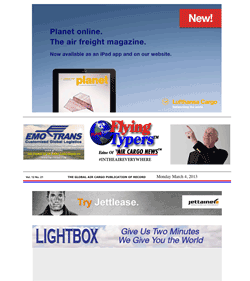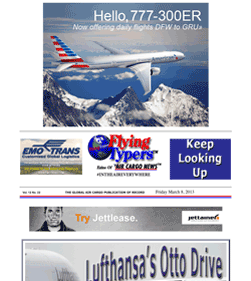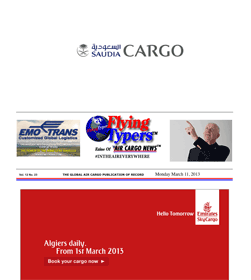|
 |
The company display stands
at WCS tend to be small—that is, no big dominator
jobs with hostesses serving finger sandwiches or anything.
But the ambiance of the displays
supplies a common ground for everybody in Doha this
week—a place to go in between tracks and meetings.
That contact level translates
into opportunities to come face to face with some people
you might not be able to get next to otherwise—an
assortment of characters from the aforementioned members
of the fourth estate to sales people, local executives,
suppliers, trade show hawkers, and, of course, the entire
IATA crew from the financial guys to the IT brains to
you name it.
This year the agenda, which
always assumes a lofty title, is called “Action
for Sustainability.”
The WCS event will launch with
a blessing and look ahead, behind, and (we assume) sideways
as well from IATA Director General Tony Tyler.
Tyler moved to his post a couple
of years back from the top job at Cathay Pacific.
Included in the opening sessions
will be reports, studies, and results that basically
share with the great unwashed just how the air cargo
business is doing and hopes to do in the coming year.
But in an airline business
rife with change, it is always interesting that often
these predictions shift up or down almost without warning.
The actual Cargo Services Conference
proceedings seldom make the headlines; that is a shame
because that is where the standards development process
takes place. The half-day parallel tracks covering Time
and Temperature, Live Animals Transportation, DGR, ULDs,
and People are perennials and seldom attract high-level
industry managers’ participation.
The “main tracks”—Environment,
Strategy, Logistic, Handling, e-Business, and regulations
program—round off the event, but it remains to
be seen how much practical, applicable knowledge is
taken away. There are many high level presenters and
panelists and also more pedestrian tracks from which
to pick and choose.
What is new is the inaugural
Future Air Cargo Executive Summit (FACES) (see story
here).
IATA has been turning WCS into
a major event by gradually adding Customs, Security,
IATA/UPU (Universal Postal Union), Cargo2000, and GACAG
to the program, making it a global meeting point of
air cargo stakeholders in a single week of a la carte
disciplines. Plenty of sponsors and advertisers—Porsche
comes to mind—give everything a nice shine. It’s
almost good enough to bask in the reflected light of
rising Middle Eastern airline powerhouses for a few
days and put aside the mundane worries of a limping
global economy and what tomorrow brings to your cargo
business.
Geoffrey/Flossie
|
|
There were
several versions of these JAL Cargo ads celebrating
their air cargo people in job functions at various
locations across the JAL Cargo System.
As we move ahead in Doha
this week, it is good to see that what goes around,
comes around.
We asked Swiss Chief Cargo
Officer Oliver Evans, who will be offering some “face
time” of his own at WCS and delivered the keynote
speech at WCS FACES, to tell us about the Summit.
“The air cargo industry
needs a wake-up call.
“We are not all about
tools, not even big, shiny ones like aeroplanes.
“We are in the people
business.
“We are the Faces of
our respective companies to our customers and suppliers.
“We stand for the values
that we nurture and sell.
“That is the meaning
of Swiss WorldCargo’s advertising and communication
campaign ‘Faces,’ in which 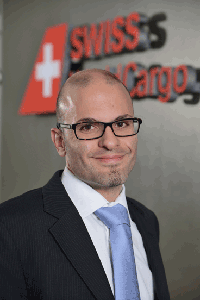 we
introduce our heroes, our own staff, and managers
as the representatives and ambassadors of our value
proposition.
we
introduce our heroes, our own staff, and managers
as the representatives and ambassadors of our value
proposition.
“And that is the meaning
of IATA’s ‘FACES’ Forum in Doha
this week.
“We are, as an industry,
in desperate need of more smart women, younger folk,
and radical thinkers.
“And IATA came up with
the acronym to fit the name ‘FACES’—
the Future Air Cargo Executive Summit.
“IATA asked: ‘Are
you the future Face of Air Cargo?’ and invited
‘rising stars’ from various industry stakeholder
groups who have both a passion for air cargo and logistics
and the potential to become future global leaders.
“The airlines, but
not only the airlines, will supply FACES.
“FACES was planned
as an interactive, participatory summit, facilitated
by a number of, well, yes, older executives, but happily
a very diverse group, including a humble role for
myself.
“The key success factor
is the participation at FACES, but also in the following
WCS, by this select group of ambitious, passionate
executives who do not normally attend such an event:
a few stimuli were by the facilitators, who were available
for chats within and around FACES, but the passion
and creativity cae from the participants.
“And of course, Swiss
WorldCargo introduced one of our brightest ‘Faces’
attending the Summit and WCS all this week, Omar Bragatto,
our Head of Cargo Contribution Management .”
Geoffrey/Flossie
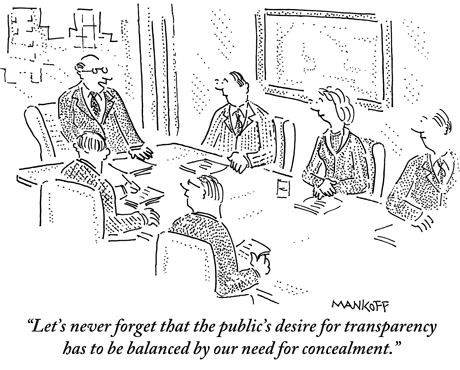 |
|
|
|
His talk addressed
the present state of the industry and challenges and
opportunities going forward.
The afternoon had an airport
track titled “How Can Airport Facilities and Infrastructure
Better Meet Your Needs” with a panel of experts,
followed by the formal opening of the exhibition.
Interesting factoid in
today’s trade show circuit: the exhibition will
be open to the public free of charge for two hours.
There are 98 companies
exhibiting which encompass the entire industry spectrum,
from airlines to airports, trucking companies, and a
variety of service providers including technology, security,
insurance, and information.
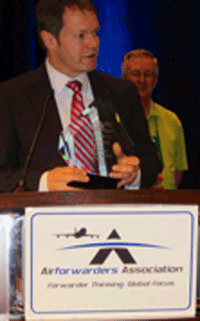 Achim Martinka, Vice
President The Americas, Lufthansa Cargo accepts International
Carrier Of The Year Award from the Airforwarders Association.
Achim Martinka, Vice
President The Americas, Lufthansa Cargo accepts International
Carrier Of The Year Award from the Airforwarders Association.
The second conference day Tuesday morning opens with
a session titled “The Panama Canal Expansion:
Discover the Opportunities Its Growth Can Provide.”
Coming in 2014, the “Super-Post-Panamax”
megaships will carry more than twice the container load
of Panama ships, directly affecting East Coast ports—Miami,
Savannah, Charleston, Norfolk, as well as Baltimore
and New York.
“Trucking Industry
Challenges Affecting Airfreight Forwarders” is
another panel that will address the impact of transportation
legislation and requirements when forwarders select
trucking companies to move shipments.
This topic involves security,
insurance, regulatory, and legal matters which taken
together can affect the cost of doing business.
Two afternoon sessions
round off the program; the first, “Employees:
What You Don’t Know Could Hurt You,” will
review cargo security in terms of the risks posed by
theft and embezzlement and its high costs as well as
drug use and gang activity.
The speaker is Bob Breza
with SPI Investigations, a twenty-year veteran of law
enforcement and expert in narcotics and gangs, whose
firm specializes in claims mitigation training and drafting
relevant company policies.
“TSA/CBP Regulatory
Briefing: All The latest Industry Compliance Developments”
is the second afternoon panel and the last session of
the conference. Participants can look forward to the
opportunity to communicate directly with senior TSA
and CBP principals as part of the session.
We will report in more
detail on the entire agenda as it evolves. Stay tuned.
Ted Braun
|
Get
On Board Air Cargo News FlyingTypers |
More
FromThe Boston Seafood Show
|
If
You Missed Any Of The Previous 3 Issues Of FlyingTypers
|
|||||
|
|||||
FT030413 |
FT031113 |
||||
|---|---|---|---|---|---|
 |


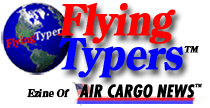
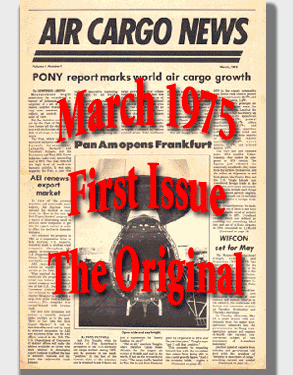
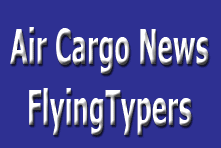

 hat
is sure to be the benchmark air cargo event of the year,
IATA’s World Cargo Symposium (WCS) in Doha this
week looks to be a formative and progressive meeting
amongst a group working to shape the future standards
of the industry.
hat
is sure to be the benchmark air cargo event of the year,
IATA’s World Cargo Symposium (WCS) in Doha this
week looks to be a formative and progressive meeting
amongst a group working to shape the future standards
of the industry. 
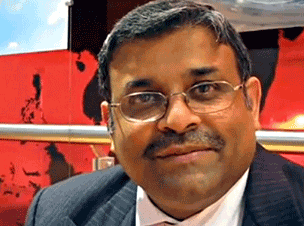
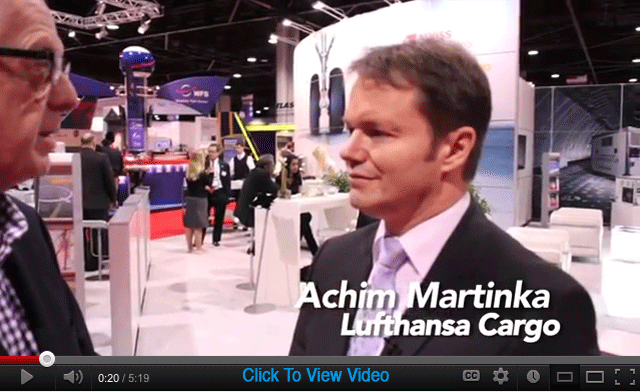
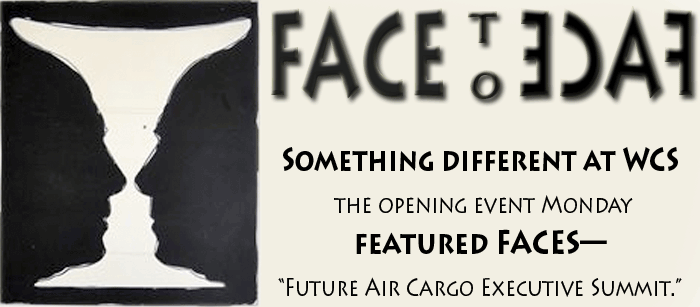
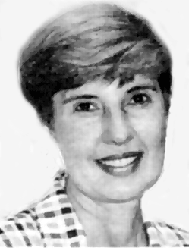 omething
different at WCS: at the opening event Monday, a new
feature called FACES (“Future Air Cargo Executive
Summit”) was “especially designed to attract,
motivate, and retain the new talents in our industry,”
according to IATA Head of Cargo Des Vertannes, and
meant “to facilitate interaction among current
and future air cargo ambassadors,” according
to IATA Secretary General Tony Tyler.
omething
different at WCS: at the opening event Monday, a new
feature called FACES (“Future Air Cargo Executive
Summit”) was “especially designed to attract,
motivate, and retain the new talents in our industry,”
according to IATA Head of Cargo Des Vertannes, and
meant “to facilitate interaction among current
and future air cargo ambassadors,” according
to IATA Secretary General Tony Tyler.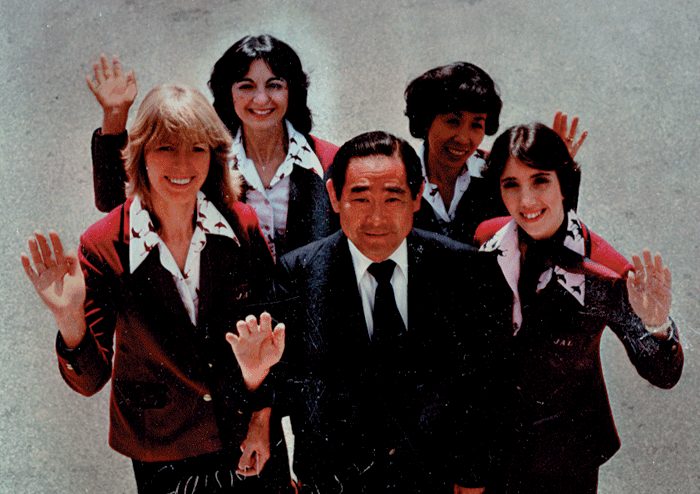
 IATA
WCS in Doha this week has succeeded bringing together
"who is who" in the industry.
IATA
WCS in Doha this week has succeeded bringing together
"who is who" in the industry.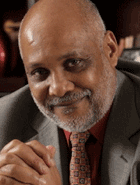 Good
thing is almost all the vital issues of our industry
are being addressed here.
Good
thing is almost all the vital issues of our industry
are being addressed here.
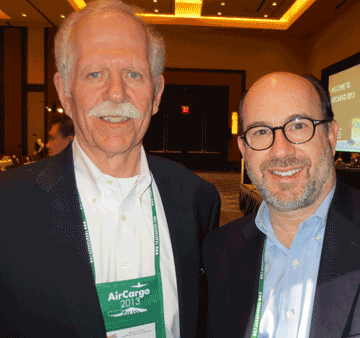
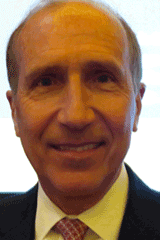
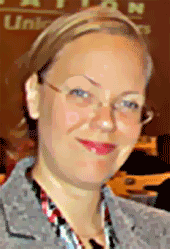 The
old cargo pro Dave Beatson (right) delivered keynote
but best question came from EMO Trans Jenni Frigger
Latham (left).
The
old cargo pro Dave Beatson (right) delivered keynote
but best question came from EMO Trans Jenni Frigger
Latham (left). Dateline
Doha—Sometimes waiting can be the great equalizer.
Dateline
Doha—Sometimes waiting can be the great equalizer. So
it’s over to a chair within eyeshot of the hotel
check-in counter and we begin our room vigil.
So
it’s over to a chair within eyeshot of the hotel
check-in counter and we begin our room vigil.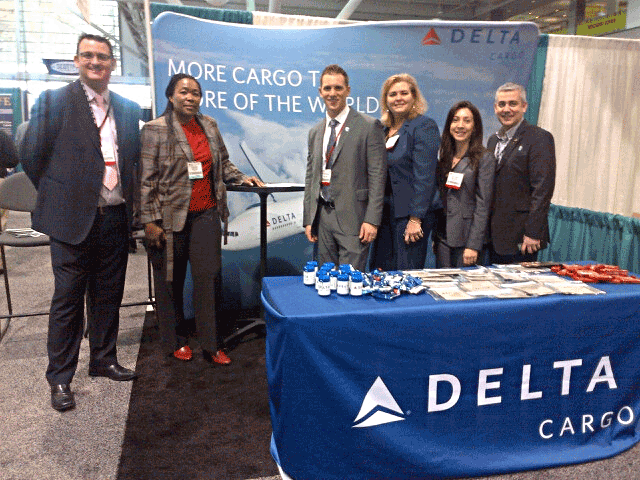 (L-R) Staffing the Delta Cargo booth
at this week’s Boston Seafood show were Neil
O'Sullivan, Cargo Sales, London-Heathrow; Rhonda Merckson,
Revenue Management; Charles Sferlazza, account manager;
Christine Waggett, account manager; Laura Cascino
(regional Cargo Sales manager; and David Linford,
director-Cargo Operations for Europe, the Middle East,
India and Africa.
(L-R) Staffing the Delta Cargo booth
at this week’s Boston Seafood show were Neil
O'Sullivan, Cargo Sales, London-Heathrow; Rhonda Merckson,
Revenue Management; Charles Sferlazza, account manager;
Christine Waggett, account manager; Laura Cascino
(regional Cargo Sales manager; and David Linford,
director-Cargo Operations for Europe, the Middle East,
India and Africa. 